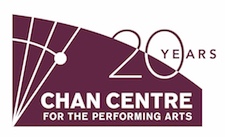Chan Shun Concert Hall at the Chan Centre for the Performing Arts | Map
Northwest Baroque Masterworks; Early Music Vancouver, executive producer; Monica Huggett, music director; Debra Nagy, baroque oboe; Kris Kwapis, baroque trumpet; Arwen Myers, soprano; Danielle Reutter-Harrah, soprano; Jane Long, soprano; Vicki St. Pierre, alto; Laura Pudwell, alto; Dr Debi Wong, alto
Celebrate the holidays with a new perspective on some old favourites. The Ospedale della Pietà is the orphanage for girls in Venice where Vivaldi was hired in 1703 as a violin teacher and then later as maestro de’ concerti. Many people do not realize that iconic works like his Gloria and Magnificat, which are now usually sung by mixed voice choirs, were originally written for his own all-female ensemble singing even the lowest parts. Join beloved violinist Monica Huggett as she leads readings of these joyful works as they were originally heard, performed entirely by women.
Supported by Bryan & Gail Atkins and Anona Thorne & Takao Tanabe
Programme
Laetatus Sum RV 607
Concerto for Oboe and Trumpet in D major, RV 563
Oboe soloist: Debra Nagy
Trumpet soloist: Kris Kwapis
1. Allegro
2. Grave
3. Allegro
Magnificat RV 610
1. Magnificat
2. Et exultavit
3. Quia respexit (Jane Long, soprano and Debi Wong, alto)
4.3. Et misericordia
4. Fecit potentiam
5. Deposuit potentes
6. Esurientes implevit
7. Suscepit Israel
8. Sicut locutus
9. Gloria
Interval
Concerto for Oboe and Violin in B flat major. RV 548
Oboe Soloist: Debra Nagy
Violin Soloist: Monica Huggett
1. Allegro
2. Largo
3. Allegro
Gloria RV 589
1. Gloria in excelsis Deo
2. Et in terra pax
3. Laudamus te (Arwen Myers, soprano I, and Danielle Sampson, soprano II)
4. Gratias agimus tibi
5. Propter magnam gloriam
6. Domine Deus (Arwen Myers, soprano)
7. Domine, Fili unigenite
8. Domine Deus, Agnus Dei (Laura Pudwell, alto)
9. Qui tollis peccata mundi
10. Qui sedes ad dexteram Patris (Vicki St. Pierre, alto)
11. Quoniam tu solus sanctus
12. Cum Sancto Spiritu
Programme Notes
The Ospedale della Pietà (Hospice of Mercy) was one of four charitable institutions in Venice that maintained and educated homeless or unwanted children at public expense. It was an orphanage for the education and care of girls, and it emphasized training in music. First a violin teacher at the Pietà, Vivaldi later obtained the position of musical director at this institution, where he worked (on and off) until 1740. Thanks to him, the music program at this institution became exceptionally successful. Every Sunday, the orchestra and choir of the Pietà offered public performances of Vivaldi’s music for the city’s elite, and eventually, its outstanding musical events (sometimes with the composer himself playing the violin) became one of the city’s main attractions. Charles de Brosses, a French traveller in Venice, reported in 1739 that “there is nothing so charming as to see a young and pretty nun in her white robe, with a bouquet of pomegranate flowers over her ear, leading the orchestra and beating time with all the grace and precision imaginable.” “Their voices,” he added, “are adorable for their quality and lightness.”
Most of Vivaldi’s music was intended for performance at the Ospedale della Pietà, and so it was performed entirely by women. His concertos especially showcased the abilities of his students. His orchestra seems to have consisted of twenty to twenty-five stringed instruments with a harpsichord or organ playing the basso continuo. The women at the Pietà also played wind instruments such as those featured in the two concertos on tonight’s programme, and Vivaldi seems to have habitually adjusted his concertos to suit the players he had on hand. The festive Concerto in D major RV 563 survives as a concerto for two trumpets or two oboes, and in the version for one trumpet and one oboe on this programme. Both tonight’s concertos are in three-movement concerto form, with contrasting fast–slow–fast movements, that Vivaldi helped establish, and which later became standard in the Classical era. The second movement largo of the Concerto for Oboe and Violin in B flat major RV 548, for example, provides a slower, emotional, and quasi-mournful foil to the piece’s brighter first and third movements. It is estimated that Vivaldi wrote between three and five hundred concertos. Remarkably, he was also a prolific composer of vocal music.
Vivaldi’s sacred vocal works Laetatus Sum, Magnificat, and Gloria were in all likelihood composed for the women at the Pietà, where, according to de Brosses, not only were people best entertained but also people could hear women sing “like angels.” The shortest of these three pieces is the lively setting of psalm 121: the Laetatus Sum in F major RV 697, for choir, strings, and continuo. “Laetatus Sum” is one of fifteen “Songs of Ascent” from the Book of Psalms that narrate the pilgrims’ journey to Jerusalem, and its joyful music helps convey their enthusiasm and unrelenting faith. The “Magnificat,” in contrast, is a bible canticle sung at the end of Vespers, in which Mary praises God, as she prepares to become the mother of the Messiah. Composed sometime between 1717 and 1719, and revised in the 1720s, Vivaldi’s Magnificat in G minor RV 610 consists of nine musical numbers, each corresponding to one section of the “Magnificat” poem. Six are choral numbers (nos. 1, 3, 4, 5, and 7), and three are for soloists (nos. 2, 6, and 8). Each number is different in terms of its mood, key, tempo, or texture. For example, the lively “Et exultavit spiritus emus” in B flat major (“My spirit rejoices,” no. 2) for three soloists, strings, and chorus, is followed by a mournful and much slower choral “Et misericordia ejus” in C minor (“He has mercy,” no. 3). Similarly, Vivaldi maximizes contrast of these musical elements, as well as mood, in his Gloria in D major RV 589 for four-part choir, strings, oboe, trumpet, and continuo. This sacred vocal work, composed around 1715, consists of twelve musical numbers, four of which require soloists (nos. 3, 6, 8, and 10). Vivaldi’s powerful and joyful opening number “Gloria,” perhaps one of the most memorable sections in this well-known sacred work, beautifully captures the jubilant mood of the Gloria—a celebratory passage in the Catholic Mass praising God the Father and Christ.
The Gloria, the only one of these three sacred works demonstrably composed for the Pietà, is written for soprano, alto, tenor, and bass. How, one may ask, were the lower parts (traditionally sung by men) performed at this institution? Women who sang sacred music, as in the Pietà, were not allowed to share choir lofts with men, so they would have had to sing the lower parts. Contraltos would have sung Vivaldi’s tenor parts, all of which lie comfortably within the low contralto range, and women with exceptionally low voices would have sung the bass parts. Indeed, a few surviving documents of the time refer to a handful of female singers at the Pietà as “tenors” or “bass singers.” Tenor and bass parts were sung at notated pitch or, as in tonight’s performance, transposed up an octave.
Like all his other musical compositions, Vivaldi’s works for the famous all-female choir and orchestra of the Ospedale della Pietà disappeared following the composer’s death in 1741 and were believed lost until their (accidental) discovery in the 1920s. Modern audiences were first introduced to the music of the “Red Priest” in the 1950s, much later than other leading composers of the period, such as Handel or Bach. Nonetheless, Antonio Vivaldi conquered modern audiences, becoming one of the most performed and recorded composers in history.
Maria Virginia Acuña
Programme Texts and Translations
Click here to download the texts and translations for this concert
Northwest Baroque Masterworks
This evening’s production is the fourth iteration of a Northwest Baroque Masterworks Project. It is part of an ongoing collaboration that has combined the resources of several Cascadian producing and presenting organizations to realize unique projects of larger-scale Baroque and Classical Masterworks on period instruments. The collaborating musical organizations in this case are the Portland Baroque Orchestra, Early Music Seattle, Early Music Society of the Islands (Victoria, British Columbia), and Early Music Vancouver (British Columbia). This all-female project seemed like a great fit for all of the partners in that to work successfully, it required key artists from all over the region and from both sides of the border. These special projects are about making great music, fostering organizational partnerships, and building a connected community of Early Music lovers throughout our whole region – thank you for your support.
Early Music Vancouver, executive producer
Celebrating its 47th anniversary in 2017, Early Music Vancouver (EMV) has a long-standing international reputation for the presentation, production and study of predominantly, but not exclusively, western classical music repertoires played on period instruments and using historically-informed performance practice. Led by Executive and Artistic Director Matthew White, it offers one of the most ambitious programs of its type in North America, presenting and producing an average of 30 concerts per year featuring internationally-renowned local, regional and guest artists. It has a Main Season that runs through the fall, winter and spring and an annual Summer Bach Festival as well as ongoing educational programmes that include the Baroque Orchestra Mentorship programme at UBC and a substantial Scholarship Programme for BC residents. It is one of the most active non-profit presenting and producing organizations in Vancouver. In 2016, EMV took on the management and administration of the Pacific Baroque Orchestra (PBO) as a fully integrated division of its operations. EMV will enjoy its 50th anniversary season in 2020.
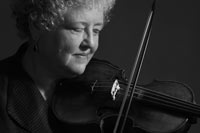
Monica Huggett, music director
From age seventeen, beginning as a freelance violinist in London, Monica Hugget has earned her living solely as a violinist and artistic director and, in 2008, was appointed inaugural artistic director of The Juilliard School’s Historical Performance Program, where she continues as artistic advisor. Monica’s expertise in the musical and social history of the Baroque era is unparalleled among performing musicians today. This huge body of knowledge and understanding, coupled with her unforced and expressive musicality, has made her an invaluable resource to students of baroque violin and period performance practice through the 19th century.
Over the last 40 years, Monica co-founded, with Ton Koopman, the Amsterdam Baroque Orchestra; founded her own London-based ensemble, Sonnerie; worked with Christopher Hogwood at the Academy of Ancient Music and Trevor Pinnock with the English Concert; toured the United States in concert with James Galway; co-founded, in 2004, the Montana Baroque Festival; and has served as artistic director of Portland Baroque Orchestra since 1994, where she made her first appearance in 1992 playing Vivaldi’s Four Seasons. From 2006 to 2017, she was also the artistic director for Irish Baroque Orchestra, where she recorded Flights of Fantasy, named by Alex Ross in the New Yorker as Classical Recording of the Year for 2010.
Monica’s recordings, numbering well over 100, have won numerous prizes and acclaim throughout her career. In addition to her baroque violin recordings, she recorded “Angie” with The Rolling Stones in 1972. Monica lives in Portland, where she enjoys cycling and gardening (somewhat compulsively).
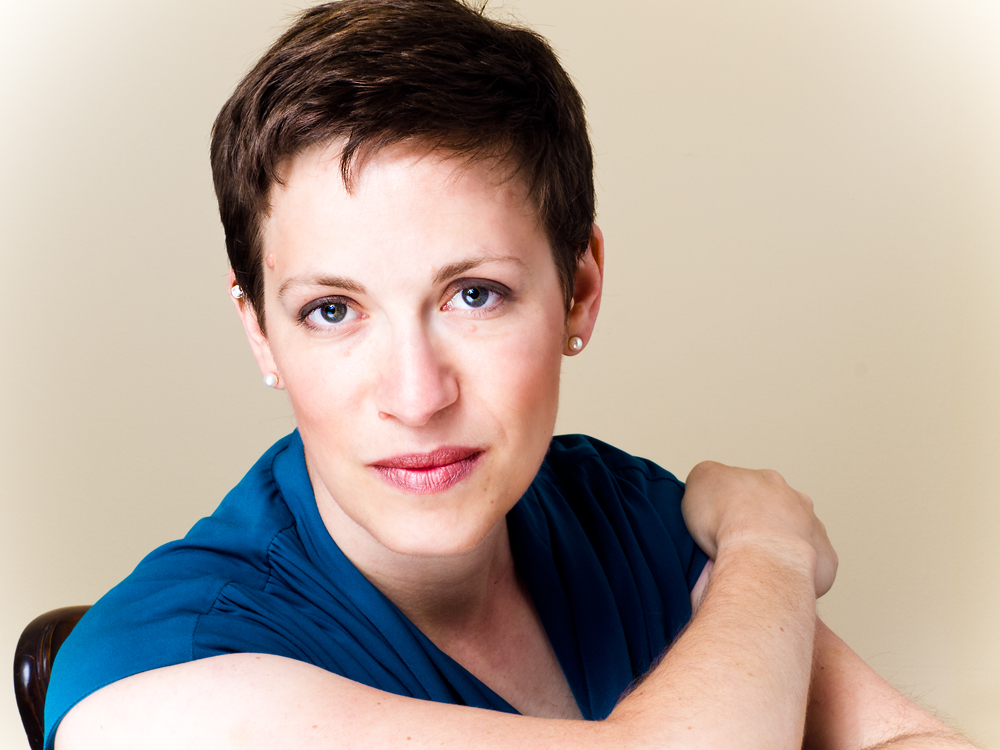
Debra Nagy, baroque oboe
Debra Nagy is one of North America’s leading performers on the baroque oboe and has been called a “musical polymath” (San Francisco Classical Voice) for her accomplished performances as a singer and historical wind player. She is the founder of acclaimed chamber ensemble Les Délices and indulges her love of late-medieval music as a regular guest with Boston’s Blue Heron and Chicago’s Newberry Consort. Inspired by a creative process that brings together research, composition in historical styles, improvisation, and artistic collaboration, highlights of Debra’s recent projects include a critically-acclaimed multimedia production of Machaut’s medieval masterpiece Remede de Fortune and a Baroque-Jazz crossover program called Songs without Words. Debra’s passion for unearthing little-known works caused The New York Times to dub Les Délices “an early music group with an avant-garde appetite,” adding “concerts and CDs by Les Délices are journeys of discovery.” She has received many awards for her creative and scholarly pursuits and her discography includes over 30 CDs with repertoire ranging from 1300-1800. Debra is also an unabashed foodie and loves commuting by bike from her home in the heart of Cleveland’s historic Ohio City neighborhood.
Kris Kwapis, baroque trumpet
Kris Kwapis appears regularly as soloist and principal trumpet with period-instrument ensembles across North America, including Portland Baroque Orchestra, Tafelmusik, Pacific MusicWorks, Bach Collegium San Diego, Oregon Bach Festival, Staunton Music Festival, Apollo’s Fire, Indianapolis Baroque Orchestra, Bourbon Baroque, and Lyra Baroque, making music with directors such as Andrew Parrott, Monica Huggett, Alexander Weimann, Barthold Kuijken, Matthew Halls, Jacques Ogg, and Masaaki Suzuki. Her playing is heard on Kleos, Naxos, ReZound, Lyrichord, Musica Omnia and Dorian labels, including the 2013 GRAMMY nominated recording of Handel’s Israel in Egypt with Trinity Baroque Orchestra in NYC, and broadcast on CBC, NPR, WNYC, WQED (Pittsburgh), Portland All-Classical (KQAC), Sunday Baroque and Wisconsin Public Radio. A student of Armando Ghitalla on modern trumpet, with a BM and MM in trumpet performance from the University of Michigan, Dr. Kwapis also holds a DMA in historical performance, and enjoys sharing her passion with the next generation of performers as a faculty member at Indiana University’s Jacobs School of Music Historical Performance Institute (teaching cornetto and baroque trumpet) in addition to teaching at her home in Seattle and online. www.kriskwapis.com
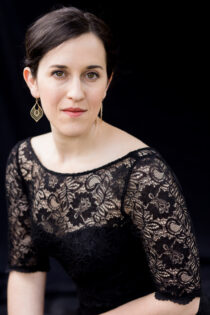
Arwen Myers, soprano
Praised for her “crystalline tone and delicate passagework” (San Francisco Chronicle), soprano Arwen Myers captivates audiences with her timeless artistry and exquisite interpretations. Transmitting a warmth and “deep poignancy” (Palm Beach Arts Paper) onstage, Arwen shines in solo performance across the US and beyond. With outstanding technique and mastery of a wide range of vocal colors, Arwen’s dazzling oratorio and solo appearances feature repertoire from the baroque to modern day, and everything in between. Her history includes appearances with Portland Baroque Orchestra, Early Music Vancouver, Pacific MusicWorks, Indianapolis Symphony Orchestra & Philharmonia Baroque Orchestra, working with such notable conductors as Nicholas McGegan, Monica Huggett, David Fallis, John Butt, David Hill, Scott Allen Jarrett, Erick Lichte & Matthew Dirst.
Recent highlights include Handel with Philharmonia Baroque Orchestra; Bach & Purcell with Portland Baroque Orchestra; Vivaldi, Monteverdi & Gabrieli with Early Music Vancouver; Handel with Oregon Bach Festival; Fauré with Indianapolis Symphony Orchestra; and the world premiere of Zachary Wadsworth’s JUNO-nominated When There is Peace with Chor Leoni, which received national broadcast across Canada. Of her title role in Handel’s Semele with American Bach Soloists Academy in 2018, San Francisco Classical Voice noted, “some of these star turns were shiny indeed, with soprano Arwen Myers leading the way… her musicality and demure demeanor remained a renewable pleasure.” An exceptionally talented and generous chamber musician, Arwen features with some of the nation’s premiere ensembles, including Seraphic Fire, Bach Akademie Charlotte, Spire Chamber Ensemble, and Bach Collegium San Diego, and Fear No Music. Arwen is represented by Aligned Artistry.
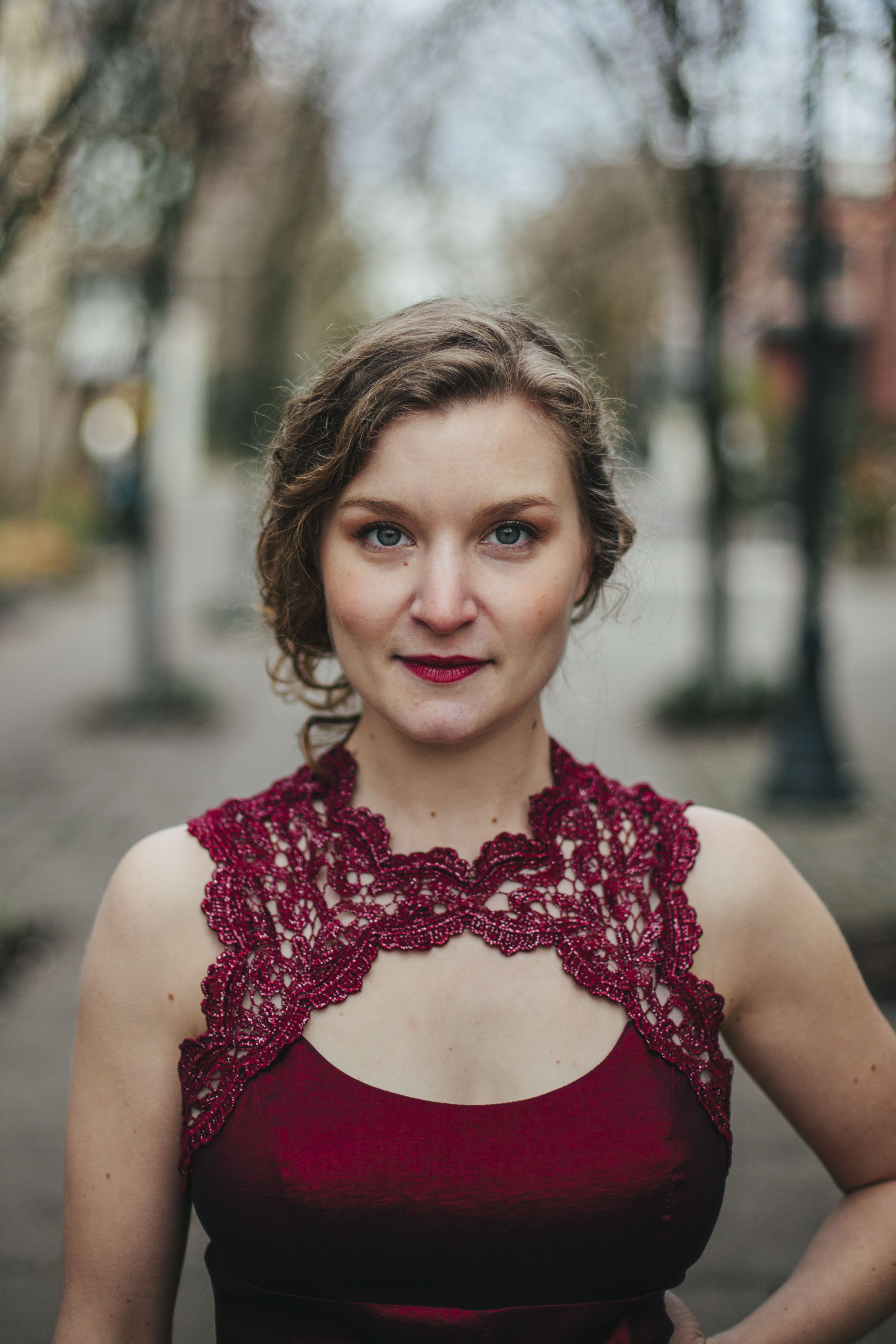
Danielle Reutter-Harrah, soprano
Danielle Reutter-Harrah has performed at the Boston Early Music Festival, with Seattle Symphony Orchestra, Seattle Opera, California Bach Society, American Bach Soloists, Baroque Chamber Orchestra of Colorado, Alabama Symphony, and Early Music Vancouver, among others. She most recently sang the role of Belinda in Baroque Chamber Orchestra of Colorado’s semi-staged rendition of Purcell’s Dido and Aeneas. In fall 2019 she performed with Pacific MusicWorks, the Byrd Ensemble and Early Music Vancouver. The 2018/19 season involved concerts of music by Brahms, Bach, Monteverdi, Handel, Clara Schumann and Fanny Mendelssohn, and others. Reutter-Harrah is a founding member of the voice and plucked strings duo Jarring Sounds, with Adam Cockerham on guitar, theorbo, Baroque guitar and lute. She sings frequently with Seattle’s Byrd Ensemble and Pacific MusicWorks. Danielle received her Bachelor’s of Music degree from the University of Denver’s Lamont School of Music and her Master of Music degree from the San Francisco Conservatory of Music. She lives in Seattle with her husband and son.
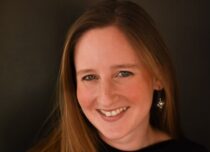
Jane Long, soprano
Hailed as a “standout” performer with “pure” and “ethereal” sound (South Florida Classical Review), Jane Long is a “clear, agile soprano” (The Georgia Straight). Vancouver, Canada, native Jane Long performs as a chamber singer, concert soloist, and recitalist. As a soloist, Jane has recently performed with the Victoria Symphony, Pacific Musicworks in Seattle, Vancouver Chamber Choir, Re:Naissance Opera, Victoria Baroque Players, chamber recitals with the St Augustine series (Vancouver), and recitals with Juno nominated pianist, Jane Coop.
Jane has had the honor of studying with renowned musicians including Emma Kirkby, Andreas Scholl, Richard Egarr, and Ellen Hargis. Some of her highlights include a staged performance of 17thCentury Italian song with Stephen Stubbs and Pacific Musicworks, a cross Canada tour of an innovative new and early music program with Arkora music collective, and performances as a soprano soloist in Early Music Vancouver’s all-women tour of Vivaldi Gloria and Magnificat, led by Monica Huggett. She sings with ensembles such as Seraphic Fire (Miami, Florida), True Concord (Tucson, Arizona), Spire (Kansas City, Missouri), Arkora (Vancouver and Toronto) and Vancouver Chamber Choir as an ensemble singer. Jane received her Bachelors of Music in Vocal Performance from the University of British Columbia and her Masters of Music in Vocal Performance from the Guildhall School of Music & Drama in London, England. She now works as a free-lance artist and lives in Washington State with her husband and three young children.
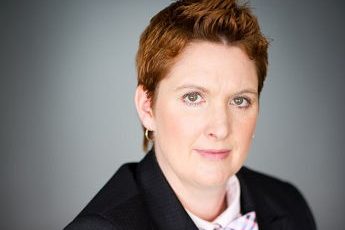
Vicki St. Pierre, alto
Contralto Vicki St. Pierre’s voice “invitingly combines clarity of expression and beauty of tone,” and is described as “rich with both a darkness and brightness.” As a specialist in early music, she has performed internationally with such groups as the Academy of Ancient Music, Tafelmusik, Les Violons du Roy, Portland Baroque Orchestra, Sacabuche, and the Pacific Baroque Orchestra. She has also performed with Symphony Nova Scotia, the Edmonton Symphony Orchestra, the Calgary Philharmonic Orchestra, and the Victoria Symphony Orchestra. She has appeared on the operatic stage with Opera Atelier, Ensemble Masques de Montreal, Toronto Masque Theatre, and Early Music Vancouver, among others. She has directed choirs across Canada and in the UK, and has been an assistant conductor with Opera Atelier. Vicki has a doctorate in vocal performance from the University of Toronto, and has been a faculty member at Mount Allison University in Sackville, NB since
2015. In 2020, Dr. St. Pierre was appointed Interim Dean of Arts, and in early 2021, she was offered the position of Dean of Arts for a 5-year term.

Laura Pudwell, alto
Grammy-nominated Laura Pudwell’s reputation as a superb vocalist has been well-established as a result of her performances in London, Paris, Salzburg, Houston, Vienna and Boston. Her vast repertoire ranges from early music to contemporary works. Ms. Pudwell is equally at home on the opera, oratorio or recital stage, and has received international acclaim for her recordings.
A frequent guest of many national and international presenters, Ms. Pudwell has had the privilege of working with many outstanding conductors, including Hans Graf, Hervé Niquet, Andrew Parrott, Ivars Taurens, Bernard Labadie, Lydia Adams, Howard Dyck and Robert Cooper.
On the opera stage, she has performed across Canada with such companies as Opera Atelier, the Calgary Opera, Vancouver Early Music and Festival Vancouver, as well as with the Houston Grand Opera and the Cleveland Opera. Her many roles include Cornelia (Giulio Cesare), Marcelina (Le Nozze di Figaro), Nerone and Arnalta (L’Incoronazione di Poppea) and Dido/Sorceress (Dido & Aeneas), which also was an award-winning recording performed by Ms. Pudwell in Paris.
Laura Pudwell is a regular participant in many festivals, including Festival Vancouver, the Ottawa Chamber Music Festival, the Banff Summer Festival, the Elora Festival, the Boston Early Music Festival and the WinterPark Bach Festival in Orlando.
Ms. Pudwell appears regularly with the Toronto Consort, and is a frequent guest soloist with Tafelmusik, the Calgary Philharmonic Orchestra, the Toronto Chamber Choir, Symphony Nova Scotia, the St. Lawrence Choir, Le Concert Spirituel and the Menno Singers.
Ms. Pudwell lives in Kitchener-Waterloo, Ontario with her husband and two children.
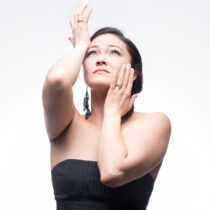
Dr Debi Wong, alto
Dr Debi Wong is a Canadian mezzo-soprano, actor and stage-director. She has been praised for possessing a “rich-toned” voice (The Vancouver Sun, CAN) and delivering and creating performances that are “mind-blowing” (Schmopera, CAN) and “unique and magical” (Rondo Classic, FI). She is also the founder and artistic director of the Vancouver-based opera company, re:Naissance.
Debi performs regularly with White Sparrow, her award-winning lute and voice duo co-founded in 2011 with Solmund Nystabakk (lute). The duo has given recitals across Europe and North America, most notably in the Stockholm Early Music Festival series, at the BRQ Vantaa Festival, the Copenhagen Renaissance Festival, the Laus Polyphinae Festival in Antwerp and in the Fabulous Fringe series at the Utrecht Early Music Festival. This season, their debut recording, Mister Dowland’s Midnight was released on SibA/Naxos records.
Debi is a graduate of Yale University (M.Mus.) and The Yale Institute of Sacred Music (Diploma in Sacred Music), where she studied vocal performance and was the recipient of the 2010 Margot Fassler award for outstanding performances in sacred music. She is currently a doctoral candidate at the Sibelius Academy in Finland.


